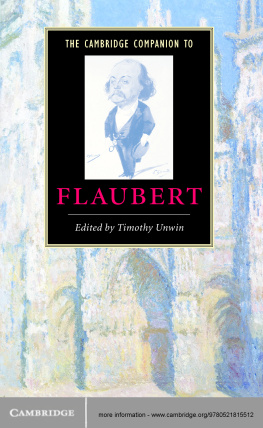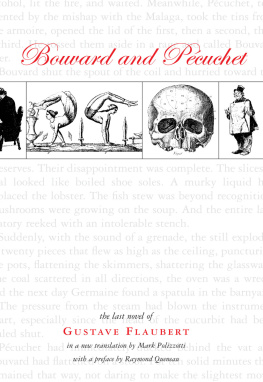Copyright 2017 by Peter Brooks
Published in the United States by Basic Books, an imprint of Perseus Books, LLC, a subsidiary of Hachette Book Group, Inc.
All rights reserved. Printed in the United States of America. No part of this book may be reproduced in any manner whatsoever without written permission except in the case of brief quotations embodied in critical articles and reviews. For information, address Basic Books, 1290 Avenue of the Americas, New York, NY 10104.
Books published by Basic Books are available at special discounts for bulk purchases in the United States by corporations, institutions, and other organizations. For more information, please contact the Special Markets Department at Perseus Books, 2300 Chestnut Street, Suite 200, Philadelphia, PA 19103, or call (800) 810-4145, ext. 5000, or e-mail special.markets@perseusbooks.com.
D ESIGNED BY L INDA M ARK
Library of Congress Cataloging-in-Publication Data
Names: Brooks, Peter, 1938author.
Title: Flaubert in the ruins of Paris : the story of a friendship, a novel, and a terrible year / Peter Brooks.
Description: 1 | New York : Basic Books, [2017] | Includes bibliographical references and index.
Identifiers: LCCN 2016042026 (print) | LCCN 2016059619 (ebook) | ISBN9780465096022 (hardback) | ISBN 9780465096077 (ebook)
Subjects: LCSH: Flaubert, Gustave, 18211880. | Novelists, French19th CenturyBiography. | Literature and societyFranceParisHistory19th century. | Paris (France)Intellectual life19th century. | Flaubert, Gustave, 18211880. LEducation sentimentale. | Sand, George, 18041876. | BISAC: HISTORY / Europe / France. | BIOGRAPHY & AUTOBIOGRAPHY / Literary. | HISTORY / Europe / General.
Classification: LCC PQ2247 .B683 2017 (print) | LCC PQ2247 (ebook) | DDC 843/.8 [B]dc23
LC record available at https://lccn.loc.gov/2016042026
ISBN 978-0-465-09607-7
E3-20170311-JV-PC
For Michael Holquist
greatest of friends, from whom I learned so much
In memoriam
1821 | December 12: Gustave Flaubert is born in Rouen (Normandy). |
1848 | February 2224: Revolution: the government interdiction of a political banquet leads to demonstrations, troops fire on the crowd (Massacre of the Boulevard des Capucines); King Louis Philippe abdicates in favor of his grandson and flees, and republicans prevail. February 24: Flaubert and Maxime Du Camp witness the sacking of the Tuileries Palace. February 25: Proclamation of the Second Republic, with poet Alphonse de Lamartine as chief executive June 2225: June Days: the ateliers nationaux are disbanded; a workers revolt is harshly suppressed by the government. December 10: Louis-Napolon Bonaparte is elected president of the Republic. |
1849 | October 29: Flaubert and Du Camp leave for their trip to Egypt and the Near East. |
1851 | June 16: Flaubert returns to Croisset. December 2: Coup dtat of Louis-Napolon Bonaparte |
1852 | December 2: Louis-Napolon becomes Emperor Napolon III, marking the start of the Second Empire. |
1856 | October 1: The serial publication of Madame Bovary begins in La Revue de Paris. |
1857 | January 31February 7: Flaubert and his publishers go on trial for Madame Bovary. April: Book publication of Madame Bovary |
1862 | Publication of Salammb |
1864 | September 1: Flaubert begins writing Sentimental Education. |
1866 | February 12: George Sand attends Restaurant Magny dinner, and her close friendship with Flaubert begins. |
1869 | November 17: Publication of Sentimental Education December: Flaubert spends Christmas with George Sand at Nohant. |
1870 | July 19: France declares war on Prussia. September 2: French are defeated at Sedan; Emperor Napolon III becomes a prisoner of the Prussians. September 4: Declaration of Third Republic in Paris September 19: Siege of Paris begins. December: Prussians occupy Rouen and take over Flauberts house in Croisset. |
1871 | January 28: Capitulation of Paris, negotiation of peace terms February 12: The new Assembly meets at Bordeaux, with Adolphe Thiers as chief executive. March 18: Thierss attempt to seize the National Guard cannon on Montmartre triggers the revolt of Paris; the government flees to Versailles. March 28: Proclamation of the Commune de Paris April 1: Flaubert returns home to Croisset. May 10: Treaty of Frankfurt ends the Franco-Prussian War. May 2128: The Bloody Week: The French Army from Versailles invades Paris and destroys the Commune. Some 20,000 Parisians are killed. June 5: Flaubert is in Paris. June 6: Flaubert visits the ruins with Maxime Du Camp. |
1872 | April 6: Death of Flauberts mother August: Flaubert starts his research for Bouvard and Pcuchet. |
1873 | October: Comte de Chambord renounces attempts to ascend the throne. May 24: The fall of Thiers; the election of Marshal Mac-Mahon as president of the Republic |
1874 | February: Publication of Victor Hugos Ninety-Three April: Publication of Flauberts The Temptation of Saint Anthony |
1875 | January 30: The Wallon Amendment assures the continuation of the Republic. July: Ernest Commanvilles lumberyard fails, setting Flauberts financial crisis into motion. |
1876 | June 8: Death of George Sand |
1877 | April: Publication of Three Tales May 16: Mac-Mahon attempts to abrogate the parliamentary government; subsequent elections lead to a republican majority. September 8: Flaubert joins the funeral procession for Thiers. |
1878 | January 19: Flaubert dines with Lon Gambetta. |
1879 | January 30: Mac-Mahon resigns. |
1880 | May 8: Death of Flaubert |
T HIS IS THE STORY OF WHAT THE F RENCH STILL CALL THE Terrible Year, as lived by two great writers who were devoted friends, Gustave Flaubert and George Sand, and of Flauberts novel that he thought should have kept his compatriots from the catastrophe they were enduring. It was a year of almost unimaginable suffering, defeat, humiliation, hatred, and fratricidal conflict, a year when war and surrender were followed by siege, cold, hunger, then class warfare on a scale never seen before, a national bloodletting that left France traumatized on the threshold of its most enduring experiment with republican government, even as it seemed poised to retreat into monarchy. Out of the ruins left by the Terrible Year and its paroxysm in the Bloody Week of May 1871 modern France emerged.
Flaubert and Sand wrote incessantly to one another as impassioned witnesses to the unfolding of events. They were separated in space, Flaubert in his Norman home, Sand in hers in the Berry, both following the war and its aftermath with all the information they could garner. Though they began seemingly at opposite ends of the political spectrumSand a dedicated socialist and reformer, Flaubert a believer in rule by the elitethey would eventually converge in their beliefs. Flaubert would travel the greater distance, eventually avowing himself, to his own bemusement, a republican. They observed, they evaluated, they judged. And they weighed why Flauberts novel











